Introduction to Applied Biocode and Digital Liquid Phase Chip Technology
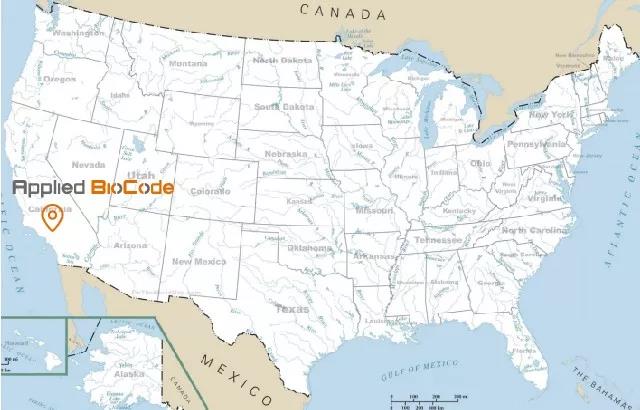
Digital liquid phase chip
Applied BioCode® pioneered the core technology of Digital Liquid Chip, a high-throughput detection technology platform based on Barcoded Magnetic Beads (BMB).
The digital magnetic beads are made by incorporating a paramagnetic material into a biocompatible polymer, and 12-bit binary digital barcodes are engraved onto the magnetic beads by photolithography, and 4096 different codes can be prepared by this process. Digital magnetic beads.
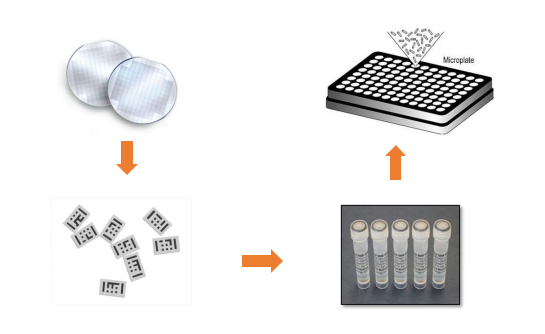
The digital magnetic beads prepared by photolithography have small batch-to-batch variation and extremely stable surface chemistry, and the barcode pattern on the digital magnetic beads can provide a strong contrast signal, which ensures the use of digital liquid phase chip technology. More accurate and stable test results can be obtained.
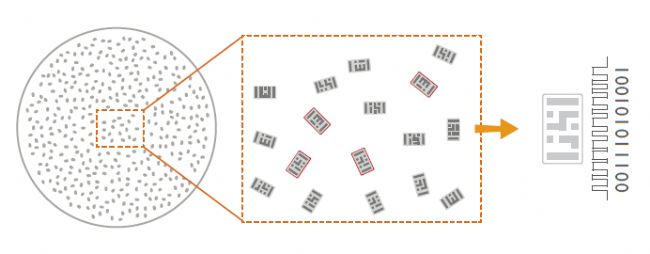
The above figure is one of the image frames at the bottom of the 96-well plate after the target reaction. It can simultaneously identify the digital bar code signal on the digital magnetic beads and detect the fluorescent signal using the existing optical technology.
Application field
The digital liquid phase chip can obtain tens or even thousands of detection results in one sample at the same time.
It can be applied to the detection and screening of diseases such as infectious diseases, hereditary diseases, allergens, autoimmunity, tumors, precision medicine, animal testing, food testing, genetic medicine, life science research, gene expression profiling, drugs and biomarkers. Fields.
core advantages
Digital multi-detection: digital signal, more accurate interpretation
High stability: photolithography produces digital magnetic beads to ensure consistent quality among digital magnetic beads
High throughput: up to 4096 indicators can be detected in a single reaction
Powerful: high-throughput detection of proteins, antibodies, and nucleic acids
Open platform: giving customers more choices
Low maintenance costs: no liquid path in the inspection system, reducing maintenance costs
Automation: One-stop automation solution available
Open platform
The digital liquid crystal chip technology platform provides customers with an open high-throughput technology platform that customers can use to develop high-throughput inspection projects based on their respective needs.
At the same time, customers can also use the developed commercial kits developed by Applied BioCode® and its commercial partners to provide customers with more choices.
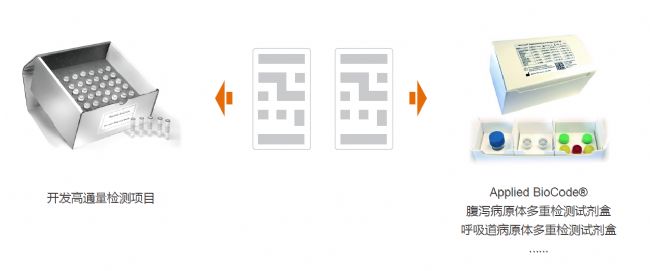
Digital magnetic beads
As an open technology platform, in order to meet the needs of different customers, we can provide dedicated digital magnetic beads (P-Carboxl BMB) for protein or antibody molecule coupling according to the characteristics of protein molecules and nucleic acid molecules; Digital magnetic beads (Carboxyl BMB).
Both of these beads are highly coupled by covalently bonding the carboxyl groups on the surface of the digital magnetic beads to the amino groups on the surface of the biomolecule. 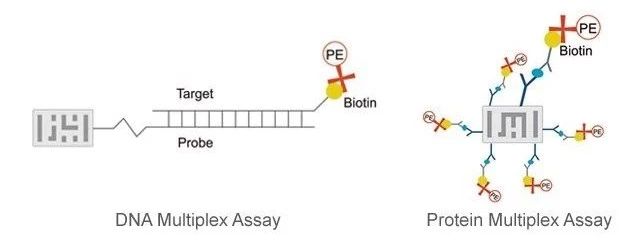
For the needs of different customers, we also provide Amino BMB digital magnetic beads, which can be coupled by covalently bonding the amino groups on the surface of the magnetic beads to the carboxyl groups on the surface of biomolecules.
At the same time, we also provide SA-BMB (Streptavidin BMB) digital magnetic beads, which have streptavidin groups on the surface, which can be combined with biotin (Biotin) modified proteins, antibodies or nucleic acid molecules. Coupling
Digital Liquid Phase Chip Development Tools
Multi-biomarker analysis based on proteins, antibodies or nucleic acids can be easily performed using the new analytical development tools from Applied BioCode®.
Nucleic acid coupling kits contain all necessary reagents and detailed instructions for coupling oligonucleotides or DNA probes to different barcode magnetic beads. The kit provides designated digital beads for your selection of probes, as well as custom multiple assay development protocols to make it easier to detect genetic biomarkers, gene expression and infectious diseases.
The Protein/Antibody Coupling Kit contains all the necessary reagents and detailed instructions for coupling proteins or antibodies to different digital magnetic beads. By assigning unique digital beads to your chosen protein or antibody, our kits make multiple immunoassays simpler and more economical, while also increasing the productivity of laboratory personnel.
Digital liquid chip detection system
The BioCode® 2500 and BioCode® MDx 3000 are two liquid-chip inspection systems developed by Applied BioCode, Inc.
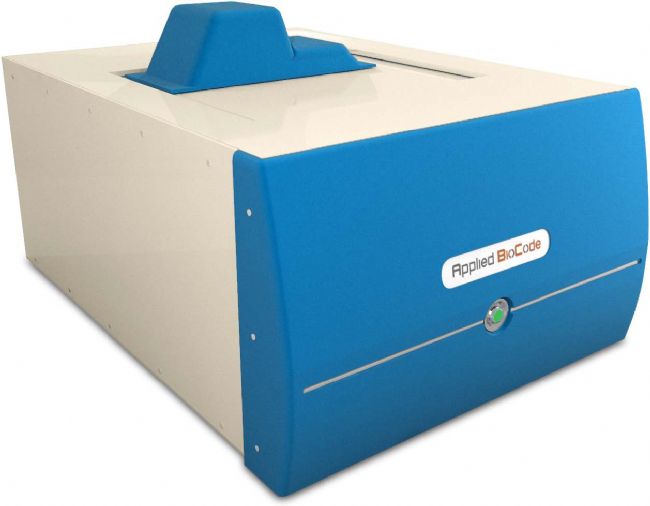
The device does not have a liquid path system, which greatly reduces equipment failures caused by liquid blockage and customer equipment maintenance costs.
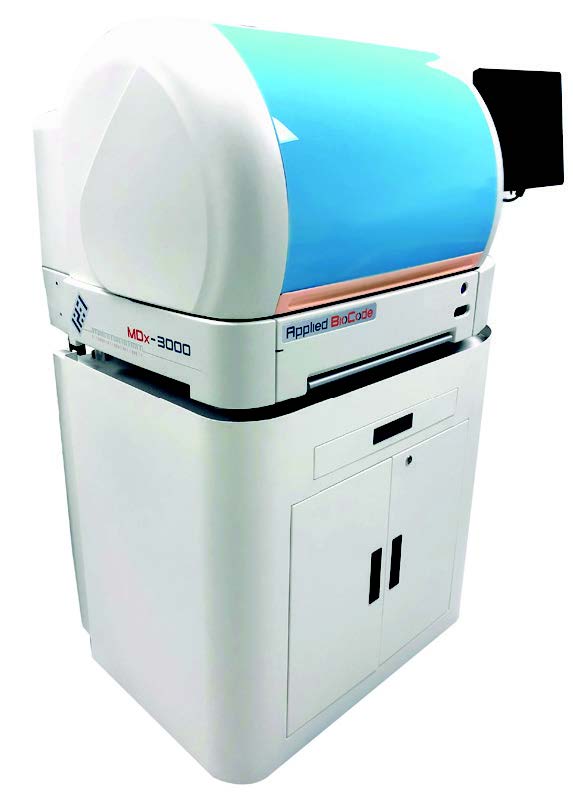 The BioCode® MDx 3000 fully automated digital liquid phase chip inspection system is an easy-to-use automated molecular multiplex detection system that integrates the post-extraction process for molecular diagnostic testing. The system is based on a 96-well microplate format that provides cost-effective, high-throughput detection.
The BioCode® MDx 3000 fully automated digital liquid phase chip inspection system is an easy-to-use automated molecular multiplex detection system that integrates the post-extraction process for molecular diagnostic testing. The system is based on a 96-well microplate format that provides cost-effective, high-throughput detection. The BioCode® MDx 3000 system performs the experimental steps of PCR amplification, hybridization and detection. Its automated and simple operation process not only shortens the manual operation time, but also minimizes the possibility of sample contamination.
The system has strong compatibility. If the experimental process is the same, the system can process 3 different detection reagents at the same time.
The BioCode® MDx 3000 also offers a “user-defined mode†that allows operators to edit and perform laboratory self-study tests (LDT) in the system.
Supporting kit
Applied BioCode® platform technology has obtained a number of international patents and has been successfully licensed to many international companies for the development of multiple detection products. At the same time, the company's self-developed diarrhea pathogen multiple detection kit (GPP) has passed the US FDA approval to enter the clinical use.
The combination of BioCode® MDx 3000 and GPP enables multiple automated detection of diarrheal pathogens, the world's first, not only reducing manual time but also minimizing the possibility of sample contamination.
Organic kale powder is processed from fresh kale. We strive to produce the best quality kale powder in the world. The entire production process is 100% organic and traceable.
Organic kale cultivation requires the following conditions. Our organic kale is planted in Hebei province, where the climate conditions are very suitable for kale growth.
1. Opulent sunshine.
2. Tastes best after a frost, so plant in early spring or late summer.
3. Sow kale from seed or nursery stock in late summer for a fall harvest or early spring for summer harvest. Sow seeds 1/2 inch deep, allowing 1 foot between plants and 2 feet between rows.
4. Mulch around kale plants with a heavy layer of garden compost. This keeps the soil cool, prevents moisture loss, and provides readily available nutrients to the shallow feeder roots.
Main processing technic: organic fresh kale, cut, clean air bubble wash, slice, dewatering and drying, steam sterilization (Temperature:>95°C Time:2′), powder.
Organic kale powder characteristics
1. 100% organic
2. non-GMO
3. Gluten-free
4. allergen-free
5. 100% pure vegetable powder without any additive
6. Fine kale powder
Kale Powder,Organic Kale Cultivation,Organic Kale Powder,Air Dried Kale Powder
Organicway (xi'an) Food Ingredients Inc. , https://www.organicwayince.com